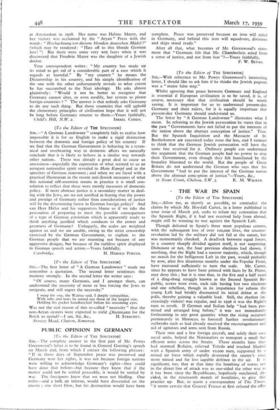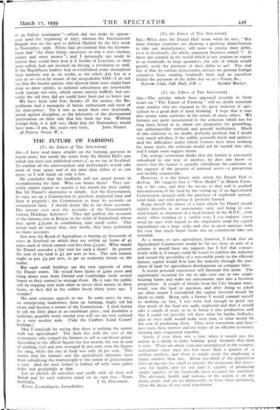• THE WAR IN SPAIN [To the Editor of THE
SPECTATOR] SIR,—Allow me, as shortly as possible, to contradict the claims by which Mr. Horsfall Carter, in a letter published in your issue of March 3rd, seeks to refute my contention that the Spanish Right, if it had not received help from abroad, might still be winning its war against the Spanish Left.
Though defeated in Spain's three most populous centres, with the subsequent loss of over Ioo,000 lives, the counter- revolution led by the military did not fail at the outset, but was momentarily checked. A deadlock between equal forces, in a country sharply divided against itself, is not surprising. Dishonest or not, the four previous elections had shown, if anything, that the Right had a narrow majority, which, though no match for the belligerent Left in the past, would probably by now, after five disastrous months under the Popular Front,
have increased sufficiently to turn the scale. Mr. Carter, since he appears to have been primed with facts by Sr. Prieto, may deny this ; but it is true that, in the five and a half years of a ding-dong struggle known as the Second Spanish Re- public, scores were even, each side having lost two elections and one rebellion, though in its impatience for reform the young Left had briskly discounted its initial defeat at the polls, thereby gaining a valuable lead. Still, the rhythm (in- creasingly violent) was regular, and in 1936 it was the Right's turn to revolt. If German and Italian help " had been pro- mised and arranged long before," it was not immediately forthcoming in any great quantity when the rising occurred prematurely in Morocco, to forestall further revolutionary outbreaks such as had already received the encouragement and aid of agitators and arms sent from Russia.
Their own and a few foreign aircraft, and solely their own naval units, helped the Nationalists to transport a small but efficient army across the Straits. Three months later they had stormed Badajoz, relieved Toledo and reached Madrid with a Spanish army of under Io,000 men, supported by a mixed air force which rapidly destroyed the enemy's even more mixed and far less capable defence in the air. It is significant, too, that at that time the bombing of towns not in the direct line of attack was as one-sided the other way as it has been since the Republicans, hopelessly outclassed, de- cided, in the nineteenth month of hostilities, to give this practice up. But, to quote a correspondent of The Times, " it seems certain that General Franco at first refused the offer of an Italian contingent "—which did not make its appear- ance until the beginning of 1937, whereas the International Brigade was on the spot to defend Madrid by the first week in November, 1936. Prieto had proclaimed that the Govern- ment had " the three things necessary to win a war—money, money and more money "; and I personally am ready to believe they could have won it if hordes of Loyalists, as they were called, had not insisted on having a revolution as well. If the Republican leaders had re-established order throughout their territory not in six weeks, as the rebels did, but in a year or so—even by means of the unspeakable SIM—I do not say that the twenty nations who allowed them arms might have done so more openly, as national consciences are notoriously weak (except our own, which seems merely baffled), but cer- tainly the aid they did get could have been put to better use.
We have been told that, besides all the money, the Re- publicans had a monopoly of heroic enthusiasm and most of the man-power. Yet it was as much their own ineptitude, pitted against discipline, as the inferiority of the disorganised intervention on their side that lost them the war. Without foreign help, it is still very likely that the Nationalists would
have won.—I am, Sir, yours very truly, JOHN MARKS. 46 Fitzroy Street, W. I.











































 Previous page
Previous page